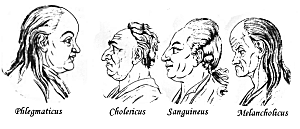 Worse than wrong? A trenchant piece from Michael Graziano likens many theories of consciousness to the medieval theory of humours; in particular the view that laziness is due to a build up of phlegm. It’s not that the theory is wrong, he says – though it is – it’s that it doesn’t even explain anything.
Worse than wrong? A trenchant piece from Michael Graziano likens many theories of consciousness to the medieval theory of humours; in particular the view that laziness is due to a build up of phlegm. It’s not that the theory is wrong, he says – though it is – it’s that it doesn’t even explain anything.
To be fair I think the theory of the humours was a little more complex than that, and there is at least some kind of hand-waving explanatory connection between the heaviness of phlegm and slowness of response. According to Graziano such theories flatter our intuitions; they offer a vague analogy which feels metaphorically sort of right – but, on examination, no real mechanism. His general point is surely very sound; there are indeed too many theories about conscious experience that describe a reasonably plausible process without ever quite explaining how the process magically gives rise to actual feeling, to the ineffable phenomenology.
As an example, Graziano mentions a theory that neural oscillations are responsible for consciousness; I think he has in mind the view espoused by Francis Crick and others that oscillations at 40 hertz give rise to awareness. This idea was immensely popular at one time and people did talk about “40 hertz” as though it was a magic key. Of course it would have been legitimate to present this as an enigmatic empirical finding, but the claim seemed to be that it was an answer rather than an additional question. So far as I know Graziano is right to say that no-one ever offered a clear view as to why 40 hertz had this exceptional property, rather than 30 or 50, or for that matter why co-ordinated oscillation at any frequency should generate consciousness. It is sort of plausible that harmonising on a given frequency might make parts of the brain work together in some ways, and people sometimes took the view that synchronised firing might, for example, help explain the binding problem – the question of how inputs from different senses arriving at different times give rise to a smooth and flawlessly co-ordinated experience. Still, at best working in harmony might explain some features of experience: it’s hard to see how in itself it could provide any explanation of the origin or essential nature of consciousness. It just isn’t the right kind of thing.
As a second example Graziano boldly denounces theories based on integrated information. Yes, consciousness is certainly going to require the integration of a lot of information, but that seems to be a necessary, not a sufficient condition. Intuitively we sort of imagine a computer getting larger and more complex until, somehow, it wakes up. But why would integrating any amount of information suddenly change its inward nature? Graziano notes that some would say dim sparks of awareness are everywhere, so that linking them gives us progressively brighter arrays. That, however, is no explanation, just an even worse example of phlegm.
So how does Graziano explain consciousness? He concedes that he too has no brilliant resolution of the central mystery. He proposes instead a project which asks, not why we have subjective experience, but why we think we do: why we say we do with such conviction. The answer, he suggests, is in metacognition. (This idea will not be new to readers who are acquainted with Scott Bakker’s Blind Brain Theory.) The mind makes models of the world and models of itself, and it is these inaccurate models and the information we generate from them that makes us see something magic about experience. In the brief account here I’m not really sure Graziano succeeds in making this seem more clear-cut than the theories he denounces. I suppose the parallel existence of reality and a mental model of reality might plausibly give rise to an impression that there is something in our experience over and above simple knowledge of the world; but I’m left a little nervous about whether that isn’t another example of the kind of intuition-flattering the other theories provide.
This kind of metacognitive theory tends naturally to be a sceptical theory; our conviction that we have subjective experience proceeds from an error or a defective model, so the natural conclusion, on grounds of parsimony if no others, is that we are mistaken and there is really nothing special about our brain’s data processing after all.
That may be the natural conclusion, but in other respects it’s hard to accept. It’s easy to believe that we might be mistaken about what we’re experiencing, but can we doubt that we’re having an experience of some kind? We seem to run into quasi-Cartesian difficulties.
Be that as it may Graziano deserves a round of applause for his bold (but not bilious) denunciation of the phlegm.
